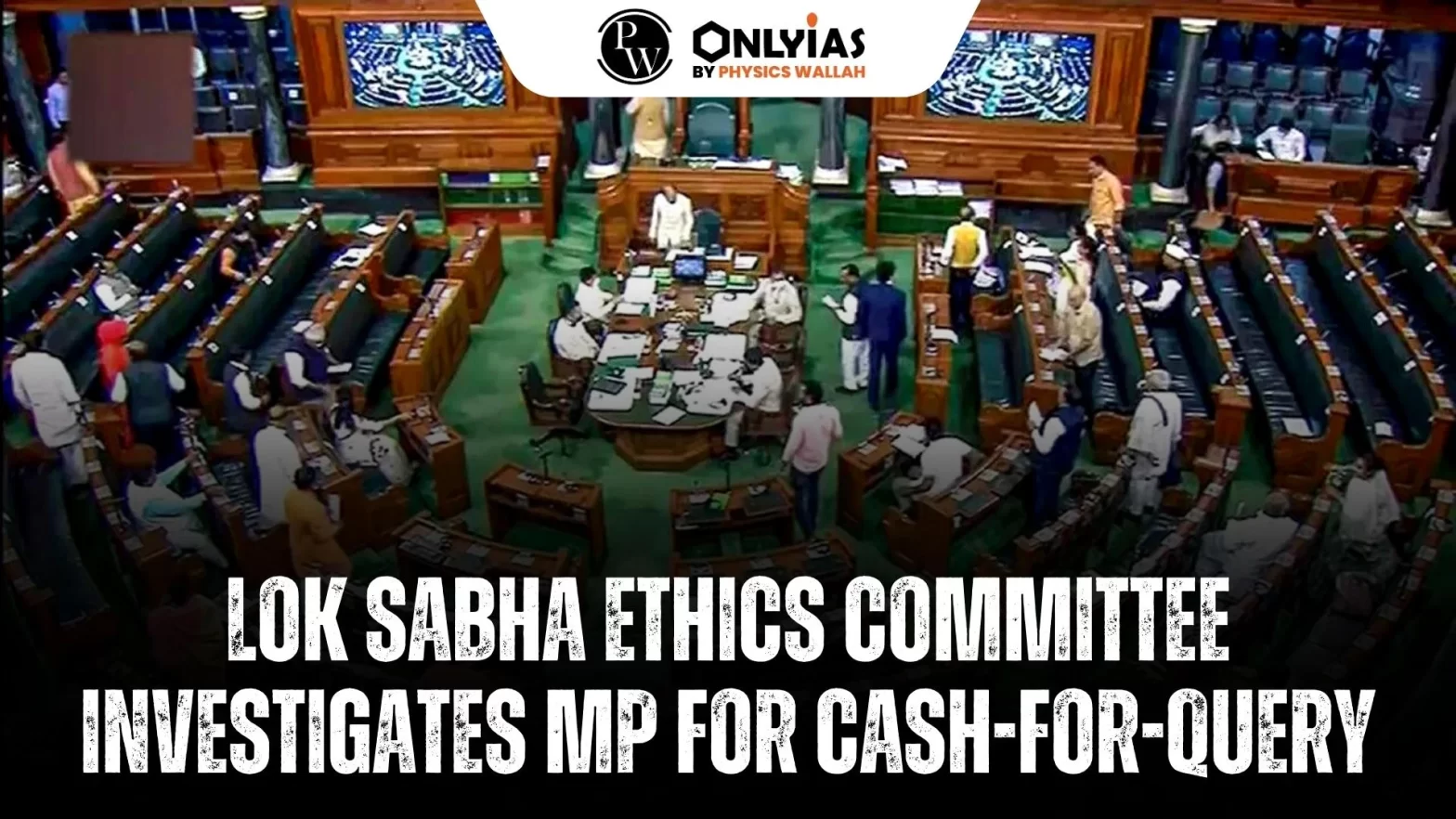Context:
- This article is based on an Editorial “Ethics, parliamentary conduct and the Indian MP” which was published in the Hindu. The Lok Sabha Ethics Committee’s proceedings against the All India Trinamool Congress Member of Parliament (MP) from West Bengal, Mahua Moitra, have resulted in much public debate.
| Relevancy for Prelims: Privileges to MPs, Ethics Committee and difference between Parliamentary and Judicial Probe.
Relevancy for Mains: Ethics Committee’s proceedings against MPs, associated concerns and steps that need to be taken. |
MP Alleges Bribery: Speaker Refers Case to Ethics Committee
- A MP lodged a complaint with the Speaker alleging that Ms. Mahua Moitra had received money from a businessman for putting questions up in Parliament with a view to promoting the person’s business interests.
- The Speaker in turn referred the complaint to the Ethics Committee for examination.
Breach of Privilege: MPs and the Unlawful Exchange of Money for Questions
- Article 105 of the Constitution gives MPs the freedom to say “anything” in the House.
- Against the Values: If an MP takes money for putting questions up in Parliament, they will be guilty of breach of privilege and contempt of the House.
- Investigation by Committees: Such complaints are referred to the Committee of Privileges for investigation, which after a proper investigation, submits its findings in a report along with the recommendation for action against the MP.
- Expulsion on Guilty: If a case involving illegal gratification for conducting parliamentary work is proven, the MP may even be expelled from the House.
- Instances: There have been such instances in the Lok Sabha where MPs were expelled from the House on this ground.
- In 1951, H.G. Mudgal, an MP of the Provisional Parliament, was found guilty of promoting the interests of a business association in return for financial benefits by putting questions up. He resigned before he was expelled by the House.
- In 2005, a sting operation by a private channel showed 10 Members of the Lok Sabha accepting money for putting questions up in Parliament and after finding them guilty by a special committee, all the MPs were expelled.
Difference between Parliamentary Probe and Judicial Probe
- Basis of Probe: A judicial body probes a matter as in the statutes and Rules, while the parliamentary committee takes decisions on the basis of common sense and the findings are on the basis of preponderance of probabilities.
- Responsibility Held By: A judicial body is conducted by judicially trained persons while parliamentary committees consist of Members of Parliament who are not experts.
- Rules of Evidence: Unlike judicial probe, the rules of evidence under the Evidence Act are not applicable to a probe by a parliamentary committee.
- The question of the relevance of the evidence of a person or a document is finally decided by the Speaker only, and not according to the Evidence Act.
What is Ethics Committee of the Lok Sabha?
- Formation and Mandate: A relatively new committee set up in 2000, with a mandate to examine every complaint related to the unethical conduct of MPs referred to it and to recommend action.
- It was also tasked with formulating a code of conduct for MPs.
- Concerns:
- Undefined Term: The term ‘unethical conduct’ has not been defined anywhere and is left entirely to the committee to examine.
- Limited Scope: More serious cases involving serious misconduct are not dealt with by the ethics committee.
- Rather dealt with by either the Committee of Privileges or special committees.
- Lack of Criminal Investigation: Parliamentary committees do not deal with criminal investigation. They decide on the basis of evidence whether the conduct of the MP is a breach of privilege or contempt of the House and punish them accordingly.
The Way Forward
- Framing of Rules: The Lok Sabha needs to frame rules to regulate the online submission of questions.
- Clear Definitions: Undefined terms like ‘unethical conduct’ should be made defined.
- Clear Demarcation: There is a need to make distinction between parliamentary discipline and criminal investigations in handling serious allegations.
Also Read: Demonstrate Impartiality: Role of Speakers in Lok Sabha and Legislative Assemblies
Conclusion:
The ongoing investigation by the Lok Sabha Ethics Committee into alleged cash-for-query involving an MP underscores the need for clear definitions, rules on online question submissions, and a distinct demarcation between parliamentary discipline and criminal investigations.
![]() 1 Nov 2023
1 Nov 2023
